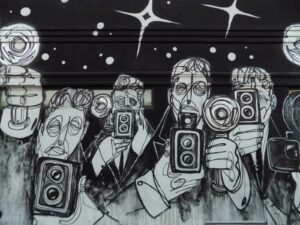Contents
AI and ChatGPT have revolutionised various aspects of our lives, from writing itineraries for trips to providing financial advice for businesses. With the growing use of ChatGPT for business activities, a number of questions and legal issues arise, such as:
- Can ChatGPT own intellectual property?
- Who owns rights in generated content – you or AI?
- Who owns copyright in AI and generated content?
- If ChatGPT provides incorrect information which a third party relies on, can they be liable?
- How can you protect your business from the legal risks involved with AI?
AI has increased significantly in popularity thanks to its wide range of capabilities, but like anything else, it also introduces risks of things going wrong. For instance, ChatGPT recently created a false allegation against a law professor, which raised the question of whether AI is capable of defaming people.
Specifically in the context of small businesses, however, AI introduces many possibilities and challenges alike. So, it’s important to take a step back and ask yourself how you can protect your business and still reap the benefits.
In this article, we’ll explore the legal aspects of AI and how IP ownership works on the business side of things.
When ChatGPT Generates Content, Who Owns That Intellectual Property?
As a business, it’s likely that you’ve given ChatGPT a go. Whether this be for your content creation or general advice, ChatGPT has an answer.
However, a common question that comes up is, “Who owns the content generated by ChatGPT?”
The answer is not straightforward. ChatGPT, as an AI, technically cannot own intellectual property in Australia. However, this does not automatically mean that you, as the user, own the content either. The concept of ‘ownership’ in this context refers to copyright interests or legal ownership.
The legal landscape surrounding AI-generated content and copyright protection is complex and still evolving. Generally, copyright laws have been designed to protect works created by human authors. However, when it comes to AI-generated content, there is an ongoing debate about whether the user’s input or direction could be considered as a creative contribution that may warrant copyright protection.
In some cases, one could argue that the user’s input in guiding the AI, such as providing prompts or instructions, might be considered sufficient to establish copyright ownership. However, this argument is not universally accepted, and the extent to which the user’s input can be deemed a creative contribution varies across jurisdictions and specific circumstances.
Until there is more clarity or consensus on this issue, it’s important to consult with legal counsel in your jurisdiction to better understand the copyright implications of using AI-generated content. Keep in mind that the situation remains complex and open to interpretation, so exercising caution is advised when using AI-generated content like that produced by ChatGPT.
Who Is Liable For Inaccurate Content Generated By ChatGPT?
When businesses rely on ChatGPT-generated content to provide information to end customers, questions of liability can arise, particularly if the content is inaccurate and results in a loss for the customer. In such cases, who is liable – the business or ChatGPT?
Given that ChatGPT is a relatively new technology, the legal landscape in this area is still developing. However, it is generally clear that businesses using ChatGPT-generated content are responsible for the consequences, rather than ChatGPT itself, as outlined in the AI’s terms of service.
Moreover, businesses are responsible for ensuring that the content produced complies with applicable laws.
The key takeaway here is that when you use content generated by ChatGPT (e.g., on your website), you are responsible for any losses suffered by third parties who rely on that information.
ChatGPT And Coding: Who Owns What?
Many businesses use ChatGPT for coding or software development purposes. This raises an interesting question: do you own the code generated by ChatGPT?
This issue is similar to the one discussed earlier regarding copyright and AI-generated content. OpenAI’s Terms of Use state that it assigns to its users “all its rights, title, and interest” in the generated output. However, it also clarifies that the output may not be unique, meaning that another user could receive the same output as you.
Thus, if you use ChatGPT for coding and the output is the same as that provided to another user, this could create potential copyright issues. To safeguard your interests, it’s worth looking into other forms of protection such as patenting your software, or maintaining it as a trade secret.
If you have questions regarding this or otherwise regarding copyright ownership of your source code, our IP lawyers can guide you through your options. Get in touch with our team for an IP Lawyer Consult.
How Can I Protect My Business’ Intellectual Property?
While AI cannot own IP, businesses certainly can. It is crucial to ensure that your legal documents secure your ownership of IP and protect it in general.
Since AI-generated content may not be covered by copyright laws, it’s essential to explore other ways to protect your IP and maintain ownership with you or your business. Let’s look into some options below.
Limiting Your Liability
Incorporating Limitation of Liability clauses into your essential legal documents can help shield your business from potential risks and minimise your legal obligations. These clauses specify the extent of your liability and define the types of losses for which you will not be held responsible.
By setting clear boundaries from the beginning, all parties involved can better understand their respective responsibilities and liabilities.
Having a Limitation of Liability clause is particularly helpful when dealing with AI-generated content and its potential inaccuracies. By explicitly defining your liability, you can protect your business from any unforeseen consequences arising from the use of AI-generated content.
Disclaimer
Transparency with your customers is important, so if you use AI-generated content, consider disclosing this to your audience. A disclaimer can inform readers that the content was generated by ChatGPT and not by you personally. It can also address any copyright or IP ownership issues, depending on the content shared.
For example, if you provide financial advice generated by ChatGPT, it’s wise to include a disclaimer stating that the information should not be construed as professional advice and that it is generic content generated by AI. You may also wish to clarify that you will not be held liable for any personal loss or detriment resulting from reliance on the information provided.
Workplace Policies
Having clear Workplace Policies in place can help ensure that your employees adhere to the proper procedures when handling AI-generated content. Incorporating these policies into your onboarding process will keep all staff aware of the correct procedures from the outset, reducing the risk of potential liability.
Chat To An Expert IP Lawyer
As AI continues to play an increasingly significant role in businesses, it’s crucial for business owners to understand the legal implications of AI, the potential impact on their operations, and the legal measures necessary for protection.
At Sprintlaw, we have a team of experienced IP lawyers who can guide you through your options.
If you would like a consultation on your options going forward, you can reach us at 1800 730 617 or team@sprintlaw.com.au for a free, no-obligations chat.
Get in touch now!
We'll get back to you within 1 business day.












